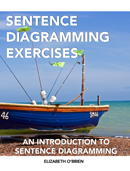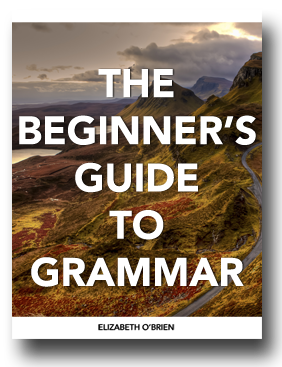Download your free grammar guide here.
Download your free grammar guide here.
Chapter 8: Diagramming Subordinating Conjunctions & Adverb Clauses
Chapter 8: Diagramming Subordinating Conjunctions
& Adverb Clauses
- Home
- How to Diagram
- Diagramming Adverb Clauses (Subordinating Conjunctions)
Subordinating conjunctions are words that introduce adverb clauses. You can also think of them as the glue that holds a dependent adverb clause to an independent clause.
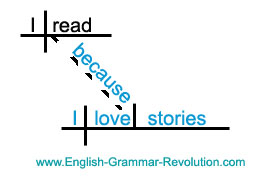
I read because I love stories.
In this sentence, because is gluing the dependent clause because I love stories to the independent clause I read.
There are many subordinating conjunctions.
although, because, before, if, since, than, unless, while
Clauses are groups of words that contain a subject and a verb. Clauses can be independent or dependent.
Independent clauses can stand alone as complete thoughts, and dependent clauses can't. Dependent clauses must be connected to independent clauses in order to make sense. There are three types of dependent clauses: adverb clauses, adjective clauses, and noun clauses.
Adverb clauses are dependent clauses that act as adverbs. That means the whole clause modifies a verb, adjective, or an adverb from another clause.
He whistled while he walked.
He whistled is an independent clause, and while he walked is a dependent adverb clause. The dependent adverb clause is modifying the verb whistled from the independent clause, and it is being introduced by the subordinating conjunction while.
Notice that the whole clause tells us more about the verb whistled. It tells us when he whistled. (Are you familiar with the adverb questions? Dependent adverb clauses answer the adverb questions.)
8.0 Diagramming Subordinating Conjunctions & Adverb Clauses
To diagram sentences with adverb clauses, start by identifying and diagramming the independent clause. Then, find the dependent adverb clause. Diagram the adverb clause below the independent clause, and connect the two clauses with a slanted, dotted line. Put the subordinating conjunction on the dotted line.
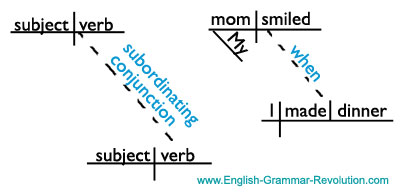
My mom smiled when I made dinner.
Directions: Diagram the following sentences. All of these sentences contain dependent adverb clauses and subordinating conjunctions.
The adverb clauses in these exercises modify the verbs in the independent clauses. Because of this, the slanted, dotted line should come off of the verb in the independent clause.
1. If the weather is nice, I will be happy.
2. Whenever my dog barks, my cat meows.
3. I ran until my legs hurt.
4. I won the race because I practiced.
5. As I walked, the sky became dark.
8.0 Diagramming Subordinating Conjunctions & Adverb Clauses - Answers
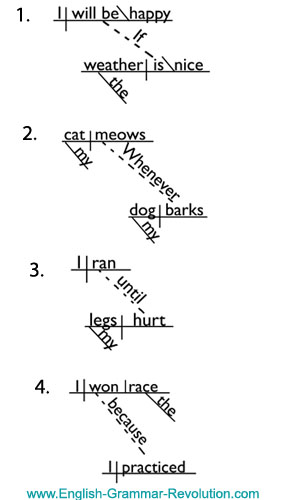
5. This answer is only available in the Sentence Diagramming Exercises Ebook.
Would you like to download these sentence diagramming exercises?
- 121 Pages
- Ebook, Instant Download
- Includes Instructions & Exercises For Diagramming Subjects, Verbs, Adjectives, Adverbs, Prepositional Phrases, Conjunctions, Interjections, Adverb Clauses, Adjective Clauses, Noun Clauses, Gerunds, Participles, & Infinitives
- Includes All Answers
- Printable
- 100% Money-Back Guarantee
- Only $19
This is my first year teaching English and you have been very helpful!
- Geoff, Classroom Teacher
This is original content from https://www.english-grammar-revolution.com/subordinating-conjunctions.html
Our Free Guide Gives You A Fun Way
To Teach And Learn The Basics v

Elizabeth O'Brien is the creator of Grammar Revolution.
Her lessons are guaranteed to give you more confidence in your communication skills and make you smile. :)
Other Helpful Resources
